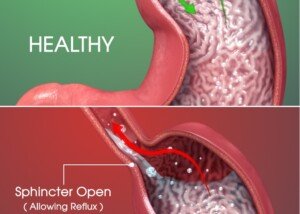LPR can be very bothersome and even disruptive. Is there a connection between LPR and a hiatal hernia?
“LPR (laryngopharyngeal reflux) refers to the reflux of stomach contents up through the entire esophagus and into the throat region, where it can lead to troublesome throat symptoms (e.g., sore throat, cough, throat clearing, voice hoarseness),” explains Santosh Sanagapalli, MD, a consultant gastroenterologist, endoscopist and specialist in esophageal disorders.
“Hiatal hernia does not directly cause any form of reflux, whether that be GERD (gastroesophageal reflux) or LPR.
“However, the presence of a hiatus hernia disrupts and weakens the anti-reflux barrier between the stomach and the esophagus, and thereby makes it more likely for reflux of any type (either GERD or LPR) to occur.”
The anti-reflux barrier is called the lower esophageal sphincter (LES). If it’s not working properly, acid in the stomach can make its way into the esophagus, and can then make it to the throat.
“Not all patients with hiatus hernia have GERD or LPR,” continues Dr. Sanagapalli.
“However, they are much more likely to have these conditions than a person without hiatus hernia present.”


 Dr. Sanagapalli
Dr. Sanagapalli
























